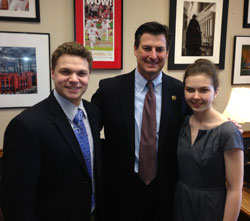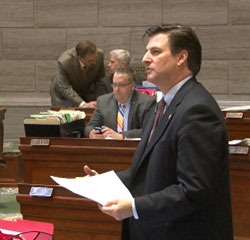
| Sponsored Bills | Co-Sponsored Bills | Biography | Releases | Multimedia |
|---|
| Week of April 29, 2013 |
| Legislative Update |
|---|
This week marked our third to last week of the legislative session. As a result, our days in the Senate were extremely full.
On Monday afternoon, senators took up House Bill 34 for debate. Under current law, the locality used for determining the prevailing wage may encompass two or more counties adjacent to the one in which the construction is performed in certain instances. This bill would only allow the county in which the work is to be performed to be used as a basis for determining the prevailing wage for counties other than third and fourth class counties and Newton County. House Bill 34 also provides a method by which the prevailing wage is determined for third and fourth class counties and for Newton County. Monday evening, the Senate also moved to send House Joint Resolutions 11 & 7 to a conference committee of members from both the House of Representatives and the Senate. Late in session, the use of conference committees becomes more prevalent as legislation passes each body in different forms. When that happens, a conference committee is assigned that contains five members from the Senate and three members of the House. Those members meet to see if they can find a compromise on the differences. If a compromise is possible, the bill is amended to reflect the same and sent back to both the House and Senate for a final vote on the conference committee report. If either chamber chooses not to accept the report, it may be returned to the same or a newly-appointed conference committee for further conferences. Tuesday morning, the Senate Seniors, Families & Pensions Committee met to hear House Bill 252, sponsored by Rep. Jeanne Lauer, R-Blue Springs. The bill would both modify existing provisions and add new provisions to Missouri’s adoption laws. One addition requires the State Registrar to develop and provide each birth parent with a contact preference form and a medical history form. The contract preference form allows parents to specify whether or not they would be willing to be contacted by their child later in life, while the medical history form requires parents to provide information about their medical history. Both documents would be filed with the birth certificate and would be confidential until the adopted child reaches adulthood and can request access to the same. The bill also allows prospective adoptive parents and parents of a prospective adoptee to enter into a written contract that would govern the relationship of the parties following the adoption. The agreement must be at the discretion of the adoptive parents, in writing, and signed by the parties. The court is required to enforce the agreement unless the court determines that it is not in the best interest of the adoptee. House Bill 252 also allows any child born in Missouri and adopted after Aug. 28, 2013, at 18 years of age or older, to provide proof of identification to obtain a copy of the person’s original birth certificate. If the adoptee is deceased, his or her lineal descendants would also be entitled to the same request unless the birth mother or father has objected. In addition to hearing House Bill 252, the committee voted on several bills it heard in previous weeks. On Tuesday morning, the Senate reconvened to work on House consent bills. Consent bills are placed on a separate calendar from other bills because they are thought to be non-controversial and therefore do not require the same amount of debate. Among those bills debated were House Bill 212, which modifies provisions relating to secured transactions under the Uniform Commercial Code, House Bill 215, which changes laws regarding judicial procedure and House Bill 233, which changes the laws regarding the Missouri State Employee Retirement System (MOSERS) and the Missouri Department of Transportation and Highway Patrol Employees' Retirement System (MPERS). Senators also debated House Bill 698, a bill that relates to several state tax credit programs. After a final vote in the Senate, House Bill 698 will now be sent back to the House with Senate revisions. Since the two chambers passed different versions of the bill, it will now likely head to a conference committee where a selected group of Senate and House members will work to reconcile the differences between the changes made to the bill by each chamber. After returning to the Senate floor Tuesday evening after a brief break for committee hearings, the Senate began to work on House Bill 112. House Bill 112 would establish a statutory cause of action, replacing the common law action, for damages against a health care provider for personal injury arising out of the rendering of or failure to render health care services. The limit on noneconomic damages for medical malpractice cases was set at $350,000 in 2005 as a result of the state Legislature’s efforts to reform tort law. In July of last year, the Missouri Supreme Court overturned that limit. House Bill 112 would reinstate the cap on noneconomic damages. After many hours of debate, the bill was placed on the informal calendar with the option of being debated at a later time. On Wednesday morning, I attended the Senate Transportation and Infrastructure Committee meeting where senators heard testimony on House Bill 103, which would allow a municipality to adopt an ordinance or resolution that would allow for the use of utility and all-terrain vehicles on roads under its jurisdiction; House Bill 787, which prohibits the Missouri Department of Revenue (DOR) from retaining copies of source documents used to obtain driver’s licenses and nondriver’s licenses; and Senate Bill 187, which exempts those over 21 years of age from wearing a helmet when riding or operating a motorcycle.
Senators returned to the Senate floor Wednesday morning and worked through several consent bills before breaking for committee hearings and visiting with constituents. During that time, I had the pleasure of meeting with two students from St. Louis County who were in town for Fine Arts Education Day at the Capitol before returning to the Senate floor that afternoon. Upon returning to the floor, the Senate took up Senate Bill 78, a bill I am sponsoring this session that would impose a 10-year "cooling-off" period for legislators who later wish to become lobbyists while also requiring anyone with a campaign account to dissolve that account prior to becoming a lobbyist. The bill also includes provisions that would allow for more transparency in the campaign contribution process by requiring candidates to report donations received above $25 to the Missouri Ethics Commission (MEC) to be posted on a website accessible to the public. The bill requires that links to the MEC website be posted on the House and Senate home pages and each senator’s and representative's home pages. Though this bill eventually had to be laid over for debate at a later date, I am glad we had an opportunity to begin discussion on such an important issue and am hopeful we can eventually get to the point of passing this or similar legislation. Following the debate of Senate Bill 78, the Senate took up House Bill 473, which would allow investor-owned electric companies to charge consumers for infrastructure improvements. After nearly three-and-a-half hours of debate, the bill was laid over onto the informal calendar for discussion at a later date. Thursday morning proved to be busy as the Joint Committee on Public Employee Retirement (JCPR) held its quarterly meeting, which was followed by a meeting of the Senate Ways & Means Committee and several committee executive sessions, where members voted on bills heard earlier in the week. Thereafter, senators returned to the Senate floor to take final votes on several House and Senate bills. After this week, the legislature will have two weeks left before the end of session. I am hopeful that I will have a lot of good news to report about our work in the Capitol over the upcoming weeks.
|
| Video |
|---|
Click here or on the image to the left to watch Sen. Lamping present Senate Bill 78 to members of the Senate. The legislation would impose a 10-year "cooling-off" period for legislators who later wish to become lobbyists, while also requiring anyone with a campaign account to dissolve that account prior to becoming a lobbyist. The bill also includes provisions that would allow for more transparency in the campaign contribution process by requiring candidates to report donations received above $25 to the Missouri Ethics Commission to be posted on a website accessible to the public. (Runtime 3:15)
| Senator Lamping in the News |
|---|
Missouri Senate Passes on Ethics Bill, Campaign Caps (The San Francisco Chronicle)
Senate Bill Would Limit Campaign Contributions (Springfield News-Leader)
Common Core Standards Could Face Hurdles (The Missouri Times)
Primary Election Shift Draws Opposition - Audio (Missourinet)
Thank you for taking the time to learn more about what the Legislature is doing for you in Jefferson City. If you have any questions or comments regarding issues in state government or within the 24th Senatorial District, please feel free to contact me. My contact information is below.
As always, it is an honor and a privilege to serve you here in Jefferson City. If you would like me to share key dates of upcoming events in our area, please submit them to my office so I can include them in this weekly column.
Senator John Lamping
24th Senatorial District
Senator Lamping serves a portion of St. Louis County Click on the image above to view Missouri Senate District 24. |
Contact Information: State Capitol Building, Room 426 Jefferson City, Missouri, 65101 (573) 751-2514 John.Lamping@senate.mo.gov |
Elected to the Senate: 2010
|
|
||





